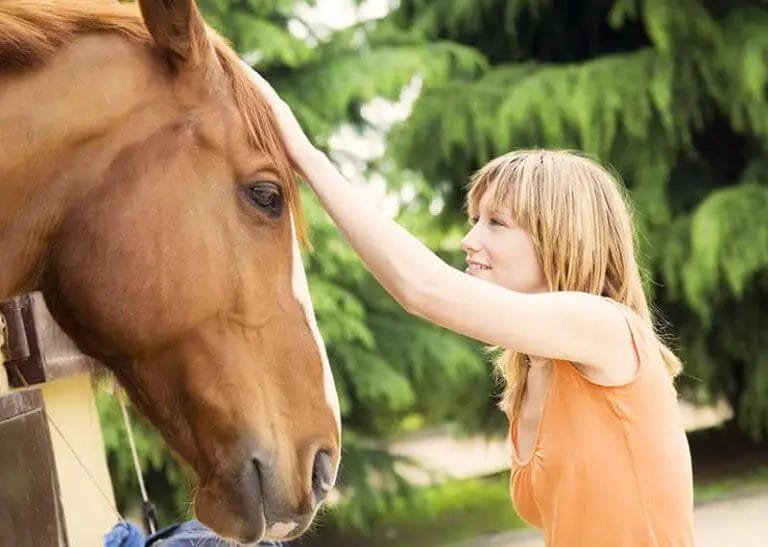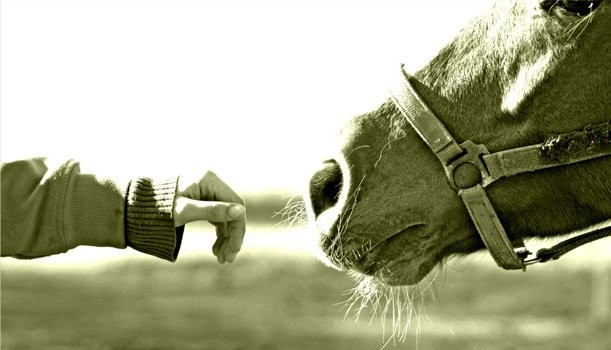Horses have been valuable companions and helpers to humans for centuries, serving countless purposes that support our daily lives. From transportation and agriculture to sports and therapy, horses have played a crucial role in various aspects of human existence. These magnificent animals have the strength, speed, and intelligence to assist us in diverse tasks, such as pulling carriages, plowing fields, competing in equestrian sports, and even providing emotional support through equine therapy. In this article, we will explore the different ways horses help and enhance our lives.

How Horses Improve Mental Health and Well-being
Horses have been known to have a therapeutic effect on individuals, improving their mental health and overall well-being. Interacting with horses can provide a unique and enriching experience that can have numerous positive effects on one’s mental state. In this section, we will explore the various ways in which horses contribute to improving mental health and well-being.
1. Emotional Connection
One of the key ways in which horses can enhance mental health is through the establishment of emotional connections. Horses are highly perceptive animals and have the ability to sense and respond to human emotions. Interacting with horses can provide individuals with a sense of companionship, empathy, and unconditional acceptance, which can be especially beneficial for those struggling with feelings of loneliness or isolation.
The act of bonding with a horse can create a safe space for individuals to express their emotions without judgment. This can help individuals develop emotional intelligence, self-awareness, and improved communication skills, which are essential for maintaining healthy relationships and managing stress.
2. Mindfulness and Stress Reduction
Spending time with horses can also promote mindfulness, which is the practice of being fully present in the moment. Horses are inherently present-focused animals, and interacting with them requires individuals to be fully engaged and aware of their surroundings.
Engaging in activities such as grooming, feeding, or riding horses can be incredibly grounding and stress-relieving. The rhythmic movements and gentle nature of horses can help individuals relax, release tension, and alleviate symptoms of anxiety and depression.
3. Physical Exercise
Engaging in physical activity is crucial for maintaining good mental health. Horses require physical care, such as grooming, feeding, and exercising, which provides individuals with opportunities for physical exercise.
Riding a horse, in particular, can be a great form of exercise and can help improve cardiovascular health, strength, balance, and coordination. Engaging in these activities not only contributes to physical well-being but also releases endorphins, which are known as “feel-good” hormones that boost mood and contribute to overall mental wellness.
4. Confidence and Self-esteem
Working with horses can have a positive impact on an individual’s confidence and self-esteem. Horses require individuals to develop leadership skills, assertiveness, and clear communication. Successfully building a relationship with a horse, achieving goals, and overcoming challenges can boost self-confidence and enhance feelings of self-worth.
Furthermore, horses are non-judgmental and respond to individuals based on their actions and body language rather than their appearance or past experiences. This can help individuals develop a more positive self-image and strengthen their belief in their own abilities.
5. Therapeutic Programs and Equine Therapy
Many therapeutic programs and interventions incorporate horses as a tool for improving mental health and well-being. Equine-assisted therapy is a growing field that involves using horses in various therapeutic interventions, such as counseling, psychotherapy, and rehabilitation.
These programs often utilize the natural connection between humans and horses to facilitate personal growth and emotional healing. Equine-assisted therapy can be beneficial for individuals of all ages, including those with mental health disorders, trauma, substance abuse issues, and developmental disabilities.
In summary, horses have a remarkable ability to improve mental health and well-being. From providing emotional connection and promoting mindfulness to enhancing physical exercise and boosting confidence, horses offer a range of therapeutic benefits. Whether through personal interaction or participation in equine-assisted therapy programs, the positive impact of horses on mental health is evident. So, if you’re looking to improve your mental well-being, consider spending some time with these majestic animals.

The Role of Horses in Physical Rehabilitation and Therapy
Physical rehabilitation and therapy are crucial components in the recovery process for individuals facing various physical challenges. Traditional methods of therapy often involve exercises and activities that may be repetitive or monotonous. However, an alternative form of therapy is gaining recognition for its unique benefits – equine-assisted therapy.
Equine-assisted therapy involves incorporating horses into the rehabilitation and therapy process. Horses have an innate ability to connect with humans and provide a therapeutic environment that promotes physical, emotional, and cognitive growth. This form of therapy has shown remarkable results in a range of conditions, including but not limited to:
- Physical disabilities
- Neurological disorders
- Post-traumatic stress disorder (PTSD)
- Autism spectrum disorder (ASD)
- Speech and language impairments
- Mental health conditions
One of the primary benefits of utilizing horses in therapy is their ability to engage patients in a non-threatening and enjoyable manner. The presence of horses during therapy sessions can reduce anxiety and create a calming effect, allowing individuals to relax and become more receptive to treatment.
Furthermore, the three-dimensional movement of a horse’s gait closely mimics the natural movement patterns of the human body. This similarity in motion can be beneficial for patients working on balance, coordination, and muscle strength. The gentle rocking motion of the horse stimulates the core muscles and promotes proprioceptive input, facilitating the development of a stable and aligned posture.
Horseback riding also provides sensory input to various body systems. The tactile sensation of touching the horse’s coat, the rhythmic sound of hoofbeats, and the smell of the stable environment engage the sensory systems, promoting sensory integration and enhancing the overall therapy experience.
In addition to the physical benefits, equine-assisted therapy offers emotional and psychological advantages. The bond and connection that can be formed between a patient and a horse can foster feelings of trust, empathy, and self-confidence. These emotional connections can be especially impactful for individuals with mental health conditions or those recovering from trauma.
Equine-assisted therapy can be tailored to meet the specific needs and goals of each individual. Therapeutic activities may involve grooming, leading, mounting, or riding the horse. These activities not only provide physical exercise but also promote problem-solving, decision-making, and communication skills.
The therapeutic environment created by horses offers a break from traditional clinical settings, which can feel sterile and impersonal. The presence of animals can create a warm and welcoming atmosphere, making therapy more enjoyable and motivating for patients. This can help improve compliance with therapy regimens and increase overall treatment effectiveness.
In summary, horses play a significant role in physical rehabilitation and therapy. Equine-assisted therapy offers a unique and effective approach to healing, incorporating the therapeutic benefits of horses to enhance physical, emotional, and cognitive well-being. By engaging patients in a non-threatening and enjoyable manner, horses create an ideal environment for growth, allowing individuals to reach their full potential in their recovery journey.

Enhancing Emotional Connection and Social Skills through Horses
In today’s fast-paced and technology-driven world, it is becoming increasingly important to find ways to connect with others on a deeper level and develop strong social skills. One unconventional but highly effective method of enhancing emotional connection and social skills is through interactions with horses. Horses have been revered for their intuitive nature and ability to mirror human emotions, making them ideal partners in personal growth and development.
Interacting with horses can be a transformative experience, as they offer a unique opportunity to develop empathy, communication, and emotional regulation skills. Horses are highly sensitive animals that can sense our emotions and respond accordingly. This heightened sensitivity makes them excellent teachers when it comes to emotional connection.
When working with horses, individuals are encouraged to be present in the moment and aware of their own emotions. Horses have an uncanny ability to reflect back the emotions they sense, providing immediate feedback on our emotional state. This feedback allows individuals to gain insight into their own emotional patterns and learn how to regulate their emotions effectively.
Furthermore, horses are social animals with a well-defined hierarchy within their herd. Interacting with them provides an opportunity to understand the intricacies of social dynamics and develop valuable social skills. By observing and engaging with horses, individuals can learn about communication, boundaries, assertiveness, and leadership.
One of the key aspects of enhancing emotional connection and social skills through horses is the development of trust. Horses are prey animals and rely heavily on their ability to trust others for their safety. Establishing trust with a horse requires consistent and respectful interactions, clear communication, and the ability to set boundaries.
Through the process of building trust with a horse, individuals learn how to establish trust in their relationships with others. They develop an understanding of the importance of consistency, transparency, and effective communication in building strong connections. This newfound trust and understanding can be transferred to various aspects of their personal and professional lives.
Equine-assisted therapy and learning programs have gained popularity in recent years due to their effectiveness in enhancing emotional connection and social skills. These programs utilize the unique qualities of horses to create a safe and supportive environment for personal growth. Participants engage in various activities such as grooming, leading, and riding horses, all aimed at fostering emotional connection and social skills.
In summary, horses provide a powerful platform for enhancing emotional connection and social skills. Through their intuitive nature, horses can help individuals develop empathy, emotional regulation, and effective communication. Interacting with horses also offers valuable lessons in social dynamics, trust-building, and leadership. Engaging in equine-assisted therapy and learning programs can be a transformative experience, leading to personal growth and improved social interactions.
Horses as Companions: Supporting Individuals with Disabilities
Horses have been used for centuries as a mode of transportation and as working animals. However, their role has expanded beyond these traditional purposes. Today, horses are increasingly recognized for their therapeutic benefits and their ability to support individuals with disabilities. In this section, we will explore the various ways in which horses can serve as companions and provide valuable assistance to individuals with disabilities.
Equine-Assisted Therapy
Equine-assisted therapy, also known as horse therapy or hippotherapy, is a form of therapy that involves interactions between individuals with disabilities and horses. This therapy uses horses as a tool to address physical, emotional, cognitive, and social goals. The movement and actions of horses can provide sensory, motor, and emotional stimulation, which can help individuals improve their balance, coordination, muscle strength, and overall well-being. Equine-assisted therapy has been found to be particularly effective for individuals with conditions such as cerebral palsy, autism spectrum disorder, and multiple sclerosis.
During equine-assisted therapy sessions, individuals may engage in various activities such as grooming, feeding, and riding the horse. These activities help individuals develop trust, confidence, and communication skills. The rhythmic motion of the horse’s gait can also have a calming effect on individuals, reducing stress, anxiety, and improving mood. Equine-assisted therapy is typically facilitated by trained professionals, such as occupational therapists, physical therapists, or mental health professionals, who work in collaboration with the horses.
Therapeutic Riding
Therapeutic riding, also known as horseback riding for individuals with disabilities, is another way in which horses can support individuals with disabilities. Therapeutic riding involves teaching individuals with disabilities how to ride and control a horse. This activity not only provides physical benefits, such as improved balance, coordination, and muscle strength, but it also helps individuals develop confidence, self-esteem, and a sense of independence. Therapeutic riding can be particularly beneficial for individuals with physical disabilities, such as those with spinal cord injuries or amputations.
During therapeutic riding sessions, individuals learn to control the horse’s movements through cues and commands. This requires them to develop their communication and problem-solving skills while also building a bond with the horse. Therapeutic riding is often conducted in a structured setting under the guidance of trained instructors who ensure the safety and well-being of the participants.
Emotional Support
Horses can also provide valuable emotional support to individuals with disabilities. The non-judgmental and accepting nature of horses can create a safe and nurturing environment for individuals to express their emotions and build relationships. Interacting with horses can help individuals develop empathy, patience, and emotional regulation skills. Horses are known for their ability to sense emotions and respond to them, which can be particularly beneficial for individuals with mental health conditions, such as depression, anxiety, or post-traumatic stress disorder.
The presence of horses can also enhance social interactions and improve social skills. Participating in equine-assisted activities or therapeutic riding programs can provide individuals with disabilities an opportunity to connect with peers and engage in meaningful social interactions. The shared experience of working with horses can foster a sense of belonging, camaraderie, and support among individuals with disabilities.
Accessibility Considerations
When utilizing horses as companions for individuals with disabilities, it is important to consider accessibility. Facilities that offer equine-assisted therapy or therapeutic riding programs should ensure that their premises are accessible for individuals with mobility impairments. This includes providing ramps, wide doorways, and accessible bathroom facilities. Additionally, horses used in these programs should be well-trained, calm, and suitable for individuals with different abilities. Trained professionals should also be available to provide support and guidance during interactions with the horses.
In summary, horses can serve as valuable companions and provide support to individuals with disabilities. Equine-assisted therapy and therapeutic riding offer unique opportunities for individuals to improve their physical, emotional, and social well-being. The bond that can be formed between individuals and horses can be transformative, enhancing their quality of life and overall sense of well-being. By recognizing and harnessing the therapeutic benefits of horses, we can create inclusive spaces and opportunities for individuals with disabilities to thrive.
FAQs
How do horses help humans?
Horses help humans in various ways. They are used for transportation, agriculture, and recreational activities such as horseback riding. Horses can also be trained for therapeutic purposes, helping individuals with physical, mental, or emotional challenges. Additionally, they are often used in competitive sports like racing and show jumping.
Conclusion
In conclusion, horses have proven to be invaluable companions and helpers to humans in various ways. Their strength and endurance make them ideal for tasks such as transportation, agriculture, and sports. Horses also provide therapeutic benefits to individuals with physical, cognitive, and emotional challenges, through activities such as horseback riding and equine-assisted therapy.
Furthermore, horses play a significant role in our cultural and recreational activities, as they are featured in horse racing events, equestrian competitions, and leisurely horseback riding. Their ability to form strong bonds with humans and their gentle nature make them excellent therapy animals, supporting individuals in their physical and emotional healing journey.
In summary, whether it’s in the field of work, therapy, or recreation, horses continue to demonstrate their importance and partnership with humans, enriching our lives in countless ways.
